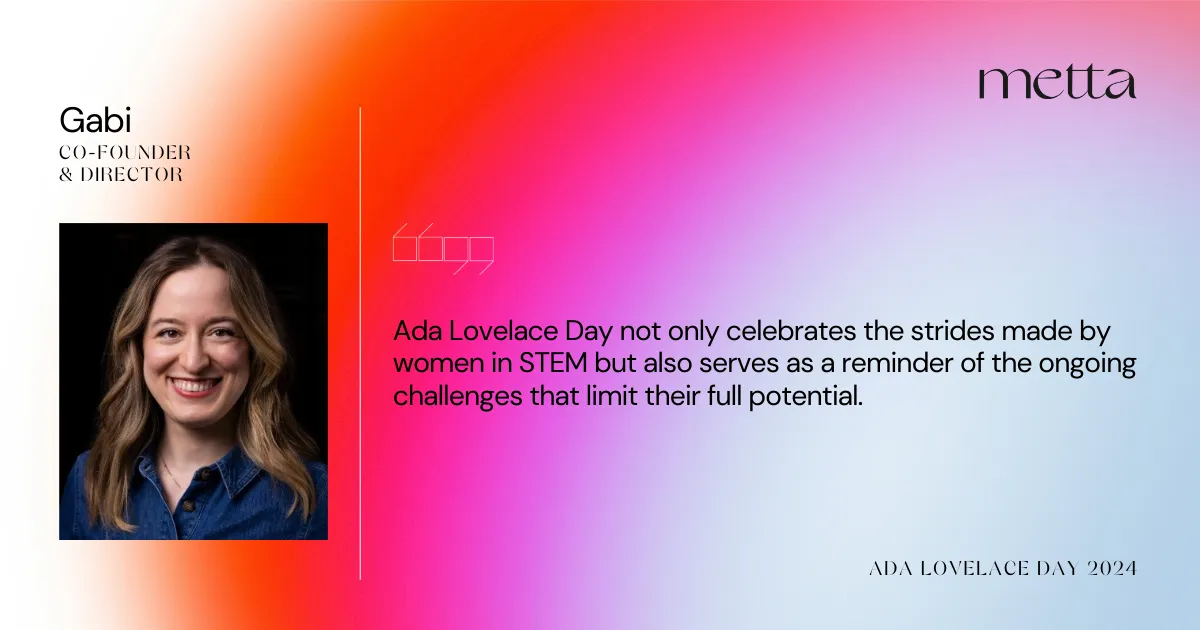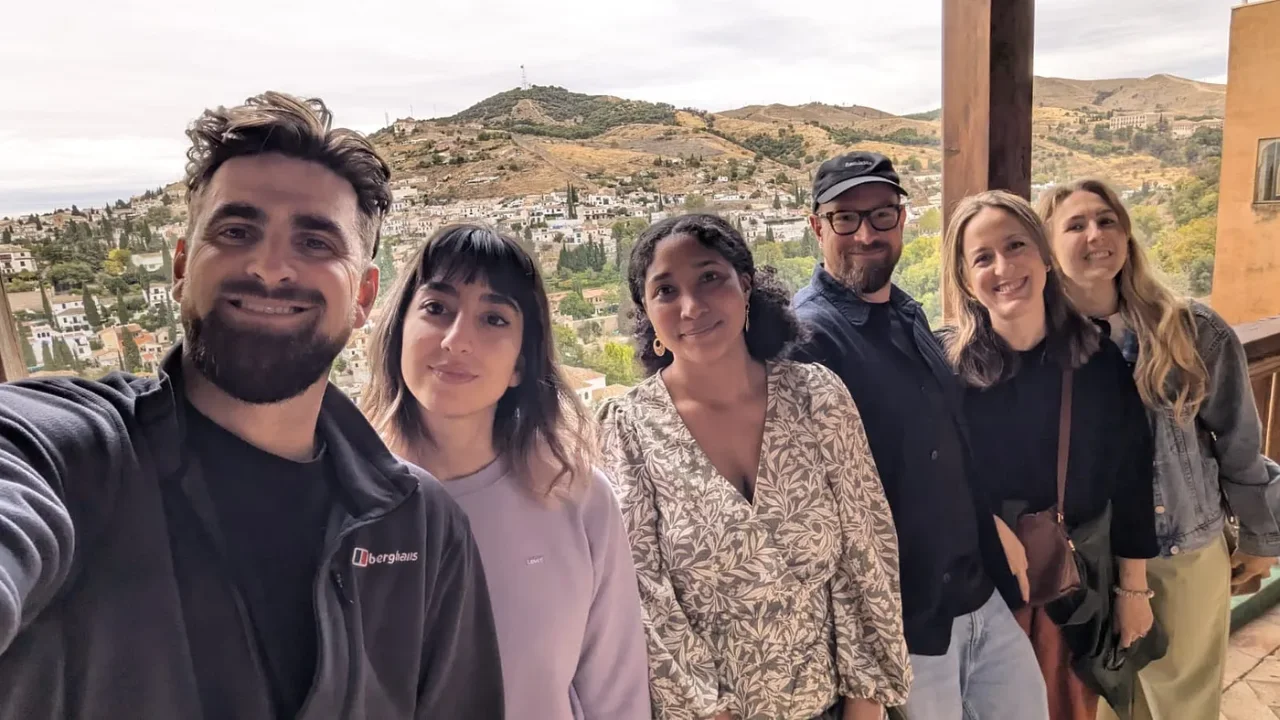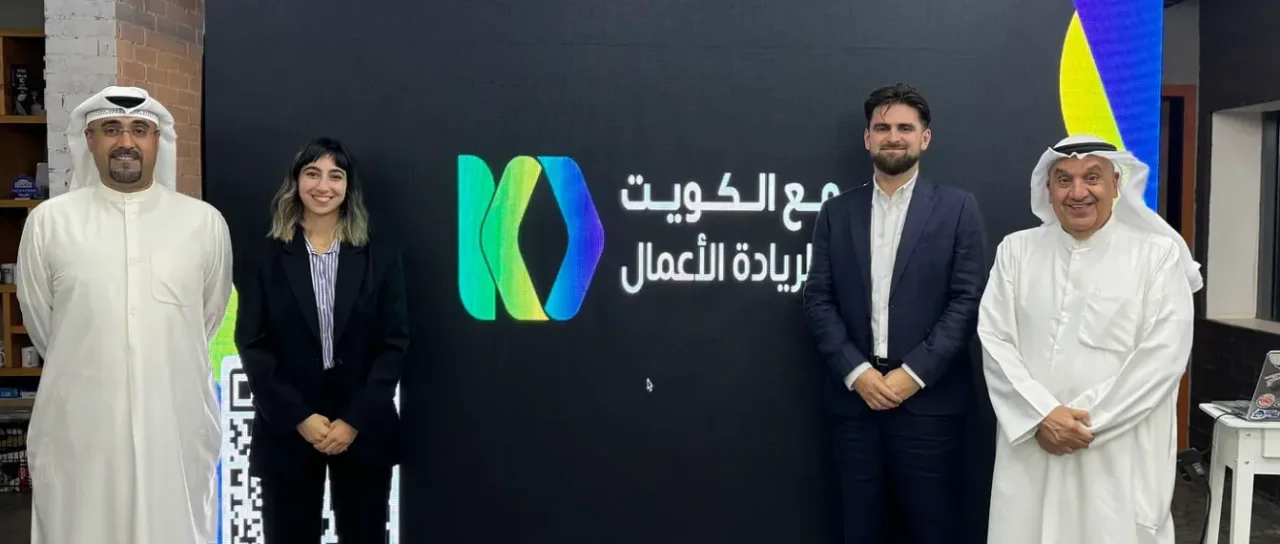Article
On the gender gap in STEM, the benefits of diversity, and male allies
Reflections on Ada Lovelace Day: an interview with Metta´s Co-founder & Director Gabi Matic.

Gender inequality is not only a pressing moral and social issue but also a critical economic challenge. If women — who account for half the world’s working-age population — do not achieve their full economic potential, the global economy will suffer.
In this interview on Ada Lovelace Day, Metta Co-Founder and Director Gabi Matic advocates for greater investment and support for women and girls in STEM. In the interview, we discuss structural barriers, such as gender bias, lack of funding, and societal expectations and narratives, that continue to limit female participation in high-tech and scientific industries — as well as provide some insights on the economic, social, and innovative benefits of closing the gender gap in STEM fields.
In your opinion, why is it important that we celebrate Ada Lovelace Day?
I think it is important that we celebrate Ada Lovelace Day for a couple of reasons.
Firstly, it serves as an opportunity for us to celebrate how far female representation -and recognition — in STEM has come over the years.
However, it is also a day where we can reflect on the work that still needs to be done. For all our talk, we still have a long way to go to bridge the gender gap and give women the recognition they deserve for their contributions in the field.
Why is it a problem that we have a gender gap in STEM?
The gender gap in STEM is not just an issue of fairness — it’s a barrier to progress.
Gender bias, lack of funding, and societal expectations limit female participation in critical industries that will define the future.
Until we address these structural issues, we risk missing out on the innovations that could solve the world’s most complex challenges.
What are some of the tangible benefits we can see if we solve these challenges?
There are several benefits to getting women and girls more involved in STEM.
For one, addressing the current underrepresentation of women in technology is not only crucial for fostering technological growth and innovation, but it is also an economic imperative. In Europe, for example, if companies were to increase the percentage of women in the tech workforce to approximately 45 percent — an additional 3.9 million women by 2027 — it could lead to a GDP increase of between €260 billion and €600 billion.
Other research has found that by promoting greater diversity in the field, we will be able to combat biases in research and development and foster a broader range of views and perspectives to drive innovation that is crucial for solving the problems we face as a society.

How can male allies support women in STEM?
Early in my career in tech, I spent a lot of time in rooms where I was the only woman or one of very few women. I often found those spaces lonely and challenging to navigate. Thankfully, I’ve been lucky enough to be surrounded by some amazing men, as my career progressed, who were (and are) real allies and have both tried — and are still trying — to make a difference.
Supporting women in STEM isn’t just about creating opportunities — it’s about dismantling the barriers that keep them from succeeding. Men can make a difference by challenging biases, advocating for inclusive policies, and ensuring that women and girls have equal access to funding, mentorship, and leadership roles.
What advice would you give to women and girls trying to make their way in STEM?
My advice would be to focus on what you bring to the table and why you are a real asset to your team or business, rather than worrying about being in the minority.
Don’t internalise sexist attitudes or allow them to diminish your confidence. Instead, champion yourself and your fellow women. We are stronger when we support each other and reject the ‘no space at the top’ narrative.
Ada Lovelace broke new ground in her time; now it’s up to us to continue that legacy of innovation, knowing our contributions are invaluable.
About Gabi Matic
Besides running Metta, Gabi is a Venture Partner for Aerospace Xelerated, where she supports early-stage startups developing scalable and sustainable solutions for the aerospace industry and beyond. Gabi has been responsible for designing, recruiting for and running accelerator programmes across the UK mainland, as well as a core focus on programme pipelines, having served as the former Programme Director for Ignite.
A seasoned entrepreneur and startup founder, she has extensive experience in running and growing startups, with particular expertise in digital marketing, user acquisition, sales and fundraising. Committed to constantly learning and growing, Gabi is also an aspiring Behavioural Scientist, currently studying at LSE.
Want to have a chat? Connect with Gabi via Linkedin







